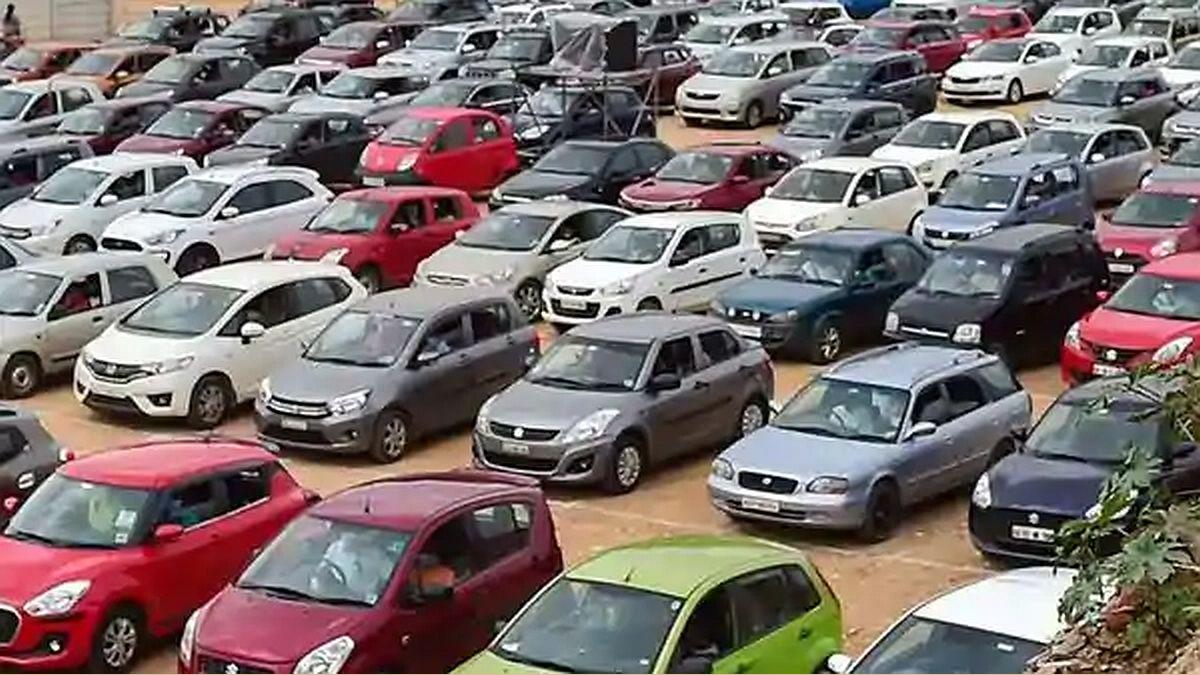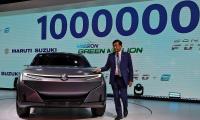Maruti Suzuki Aims for Significant Export Growth by 2030
Maruti Suzuki plans to significantly increase its exports by 2030, aiming for multiple times growth in overseas shipments. The automaker is also focusing on developing electric vehicles and exploring alternative fuel technologies like biofuels and hydrogen to reduce carbon emissions.

Photograph: PTI Photo from the Rediff Archives
New Delhi, Sep 10 (PTI) Maruti Suzuki India (MSI) is looking at a significant increase in its overseas shipments by 2030, MD and CEO Hisashi Takeuchi said on Tuesday.
Speaking at the 64th annual session of industry body SIAM here, he noted that the automaker's overseas shipments will witness "multiples of growth" in coming years.
"There is no reason why India should not target a big pie of global trade. As Maruti Suzuki, I can tell you we are not talking about percentage growth but in terms of multiples of growth. So, our exports from India today are three times of what we had four years ago. Not only that, our exports will be 3 times of today in about 6 years from today," Takeuchi said.
The company is already exporting some vehicles back to Japan, he said.
Last month Maruti Suzuki commenced export of its sports utility vehicle Fronx to Japan.
The first consignment of over 1,600 vehicles left for Japan from Gujarat's Pipavav port.
Fronx is the first SUV from the MSI stable to be launched in Japan.
MSI's exports have increased by 1,85,774 units between FY21 and FY24.
Takeuchi noted that in the domestic market it is looking to utilise all kinds of technologies in its cars to combat carbon emissions.
Besides electric and strong hybrid cars, the auto maker would also look at developing models around bio-fuels and hydrogen as well, he noted.
"We will use all technologies to combat carbon emissions and oil consumption," Takeuchi said.
He noted that the automaker will have a high-specification EV with a high-range of the order of 500 km and powered by a 60 Kilowatt-hour battery.
"We will have multiple such products. All our products, services, solutions, and communication will be directed towards one theme '? increase customer confidence," Takeuchi stated.
To increase customer confidence, the auto major will export the same EVs to markets like Europe and Japan, he added.
"On top of that, we will come up with a range of solutions for our EV customers to remove their concerns on owning an EV. We will use the strength of our network to give confidence to the customers for after-sale support," Takeuchi said.
The company will also use technologies or powertrain options like hydrogen, strong hybrids, biofuels, to minimise oil consumption and CO2 emission, he stated.
"When we talk about biofuels, many of us are not aware that India is sitting on an enormous treasure of natural resources," Takeuchi said.
India has been gifted with huge human resources, agricultural resources, and animal resources and all of these produce some bio-waste, he said.
These can be converted into biofuels and have a very low carbon footprint and many times are actually carbon negative, Takeuchi said.
"Though there are many countries in the world who are using the power of biofuels, I think India can quickly become world's number one in biofuels and the rest of the world can start learning from India," he stated. "Given the size and the unique context of India, we need not copy solutions from the rest of the world," Takeuchi said.
Supporting deep localisation, he also emphasised on cutting dependence on imports of various critical components.
"This is important because a country of the size of India needs self-reliance in the entire value chain and almost eliminate import dependence," Takeuchi said.
The country also needs this because only the manufacturing sector can create large scale jobs for youth and elevate India from today to developed nation, he stated.
Speaking at the 64th annual session of industry body SIAM here, he noted that the automaker's overseas shipments will witness "multiples of growth" in coming years.
"There is no reason why India should not target a big pie of global trade. As Maruti Suzuki, I can tell you we are not talking about percentage growth but in terms of multiples of growth. So, our exports from India today are three times of what we had four years ago. Not only that, our exports will be 3 times of today in about 6 years from today," Takeuchi said.
The company is already exporting some vehicles back to Japan, he said.
Last month Maruti Suzuki commenced export of its sports utility vehicle Fronx to Japan.
The first consignment of over 1,600 vehicles left for Japan from Gujarat's Pipavav port.
Fronx is the first SUV from the MSI stable to be launched in Japan.
MSI's exports have increased by 1,85,774 units between FY21 and FY24.
Takeuchi noted that in the domestic market it is looking to utilise all kinds of technologies in its cars to combat carbon emissions.
Besides electric and strong hybrid cars, the auto maker would also look at developing models around bio-fuels and hydrogen as well, he noted.
"We will use all technologies to combat carbon emissions and oil consumption," Takeuchi said.
He noted that the automaker will have a high-specification EV with a high-range of the order of 500 km and powered by a 60 Kilowatt-hour battery.
"We will have multiple such products. All our products, services, solutions, and communication will be directed towards one theme '? increase customer confidence," Takeuchi stated.
To increase customer confidence, the auto major will export the same EVs to markets like Europe and Japan, he added.
"On top of that, we will come up with a range of solutions for our EV customers to remove their concerns on owning an EV. We will use the strength of our network to give confidence to the customers for after-sale support," Takeuchi said.
The company will also use technologies or powertrain options like hydrogen, strong hybrids, biofuels, to minimise oil consumption and CO2 emission, he stated.
"When we talk about biofuels, many of us are not aware that India is sitting on an enormous treasure of natural resources," Takeuchi said.
India has been gifted with huge human resources, agricultural resources, and animal resources and all of these produce some bio-waste, he said.
These can be converted into biofuels and have a very low carbon footprint and many times are actually carbon negative, Takeuchi said.
"Though there are many countries in the world who are using the power of biofuels, I think India can quickly become world's number one in biofuels and the rest of the world can start learning from India," he stated. "Given the size and the unique context of India, we need not copy solutions from the rest of the world," Takeuchi said.
Supporting deep localisation, he also emphasised on cutting dependence on imports of various critical components.
"This is important because a country of the size of India needs self-reliance in the entire value chain and almost eliminate import dependence," Takeuchi said.
The country also needs this because only the manufacturing sector can create large scale jobs for youth and elevate India from today to developed nation, he stated.
You May Like To Read
TODAY'S MOST TRADED COMPANIES
- Company Name
- Price
- Volume
- Vodafone Idea L
- 7.31 (+ 1.81)
- 41530759
- Standard Capital
- 0.50 (+ 4.17)
- 20800170
- Integrated Industrie
- 18.84 ( -1.00)
- 11610923
- AvanceTechnologies
- 0.65 (+ 4.84)
- 10485304
- Srestha Finvest
- 0.55 (+ 1.85)
- 8525011






 © 2025 Rediff.com India Limited. All rights reserved.
© 2025 Rediff.com India Limited. All rights reserved.